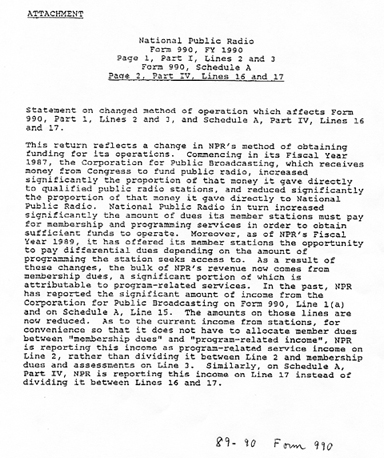In the wake of National Public Radio’s firing of Juan Williams, NPR chief Vivian Schiller has defended her network, in part, by claiming that NPR is a purely private organization that gets essentially “zero” taxpayer funding. Here’s a clip of her making that claim in an October 21 FoxNews segment:
Other National Public Radio staffers and officials have made similar assertions in the past, despite the fact that such claims are blatantly deceptive.
In fact NPR does receive large amounts of taxpayer money, but via the equivalent of a shell game – for some years now instead of the taxpayer money going directly from the taxpayer-funded Corporation for Public Broadcasting (CPB) to NPR, it has gone to the local affiliates as "community service grants," which the stations then turn around and send to NPR to help pay for the right to broadcast the network's programs.
Before 1989 the money paying for the programming went directly from CPB to NPR, and the local affiliates had nominal membership dues, ie they got the programming for essentially nothing. Since then the money has been laundered thru the affiliates, which have to pay substantial amounts for the programming.
When this change occurred it materially affected NPR's financial statements, and the network had to note it and explain it in an attachment to their IRS-required Form 990. Here's an excerpt of that attachment:
This return reflects a change in NPR's method of obtaining funding for its operations. Commencing in its Fiscal Year 1987, the Corporation for Public Broadcasting, which receives money from Congress to fund public radio, increased significantly the proportion of that money it gave directly to qualified public radio stations, and reduced significantly the proportion of that money it gave directly to National Public Radio. National Public Radio in turn increased significantly the amount of dues its member stations must pay for membership and programming services in order to obtain sufficient funds to operate....
As a result of these changes, the bulk of NPR's revenue now comes from membership dues, a significant portion of which is attributable to program-related services.
Of course, it may no longer be the case that the bulk of NPR's revenue comes from membership dues, but the point is clear: NPR is still receiving substantial amounts of taxpayer money from the CPB, but this money goes through the affiliates rather than straight to NPR. Here is an image of the full attachment:

In addition, in NPR's latest Form 990, it admits that its operating costs were paid for largely by those program fees:
Operating costs were met by program fees paid by public radio stations that broadcast NPR programming, as well as grants and contributions from foundations and corporations. (page 17 of NPR's IRS Form 990 for TY 2007)
Is NPR's Lobbying Illegal?
Another measure of NPR's dependence on taxpayer support is its lobbying to preserve the taxpayer dollars going to the CPB, which then flow to NPR's affiliates. According to its 990, in FY 2007 NPR spent a substantial amount, more than $456,000, on such lobbying.
Now under federal regulations (U.S.C. Title 26, §4911) non-profits are generally prohibited from any substantial lobbying (that is, attempting to influence legislation), but there are exceptions.
Before looking at the exception NPR is using, let's look at the network's legally required description of its lobbying, on page 63 of its Form 990:
NPR has been involved in the following lobbying activities – appropriations for the Corporation for Public Broadcasting, ...
That is, the first item listed is preserving the taxpayer funds that go to the CPB, which NPR claims it is not dependent on!
Now, if as NPR claims to the public, they really got no funding from the CPB, then their lobbying would be blatantly illegal. That's because for NPR the only applicable exception to the prohibition on lobbying is the "self-defense" clause, and in particular the part referring to the "continued existence" of the organization. Here's the text of that exception clause (U.S.C. Title 26 § 4911(d)(2)(C) ):
appearances before, or communications to, any legislative body with respect to a possible decision of such body which might affect the existence of the organization, its powers and duties, tax-exempt status, or the deduction of contributions to the organization;
In other words, the loophole that NPR exploits to lobby congress proves that it itself believes public funding, and CPB funding in particular, is crucial to its existence. Why won't NPR admit this to the public? Indeed, why does it disingenuously claim the opposite?
What is the total amount of taxpayer funding for public radio?
According to the CPB's Public Broadcasting Revenue: Fiscal Year 2008, public radio got at least 26% of its revenue from public sources, including the Congressional appropriation to CPB, Federal Grants and Contracts, Local Governments, State Governments and State Colleges and Universities, an amount that totals almost $252,000,000 dollars. (derived from Table 2) By far, most of this taxpayer-based funding for public radio goes to NPR and its affiliates. A relatively small amount goes to other public radio, such as the egregiously biased, lunatic fringe Pacifica Radio, which is so extreme in its coverage of Israel that it actually makes NPR sound reasonable.
The bottom line is that contrary to NPR's claims, the local affiliates are using taxpayer money, much of it funneled through the CPB, to pay for NPR's programming, which they otherwise could not afford. And without that money that is then sent to NPR, the network could not survive. Which is why NPR fights so hard to maintain and even increase that taxpayer funding.
